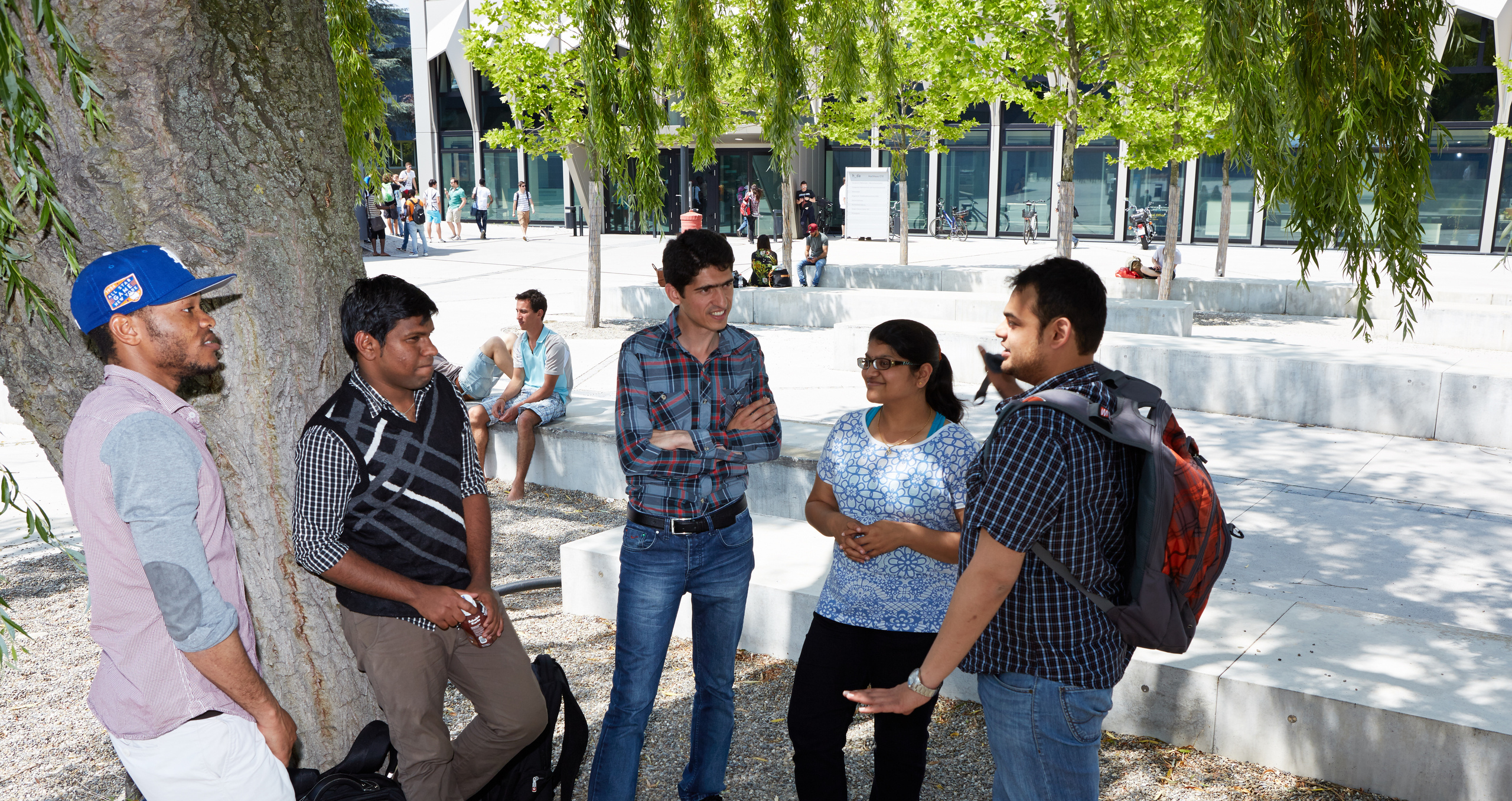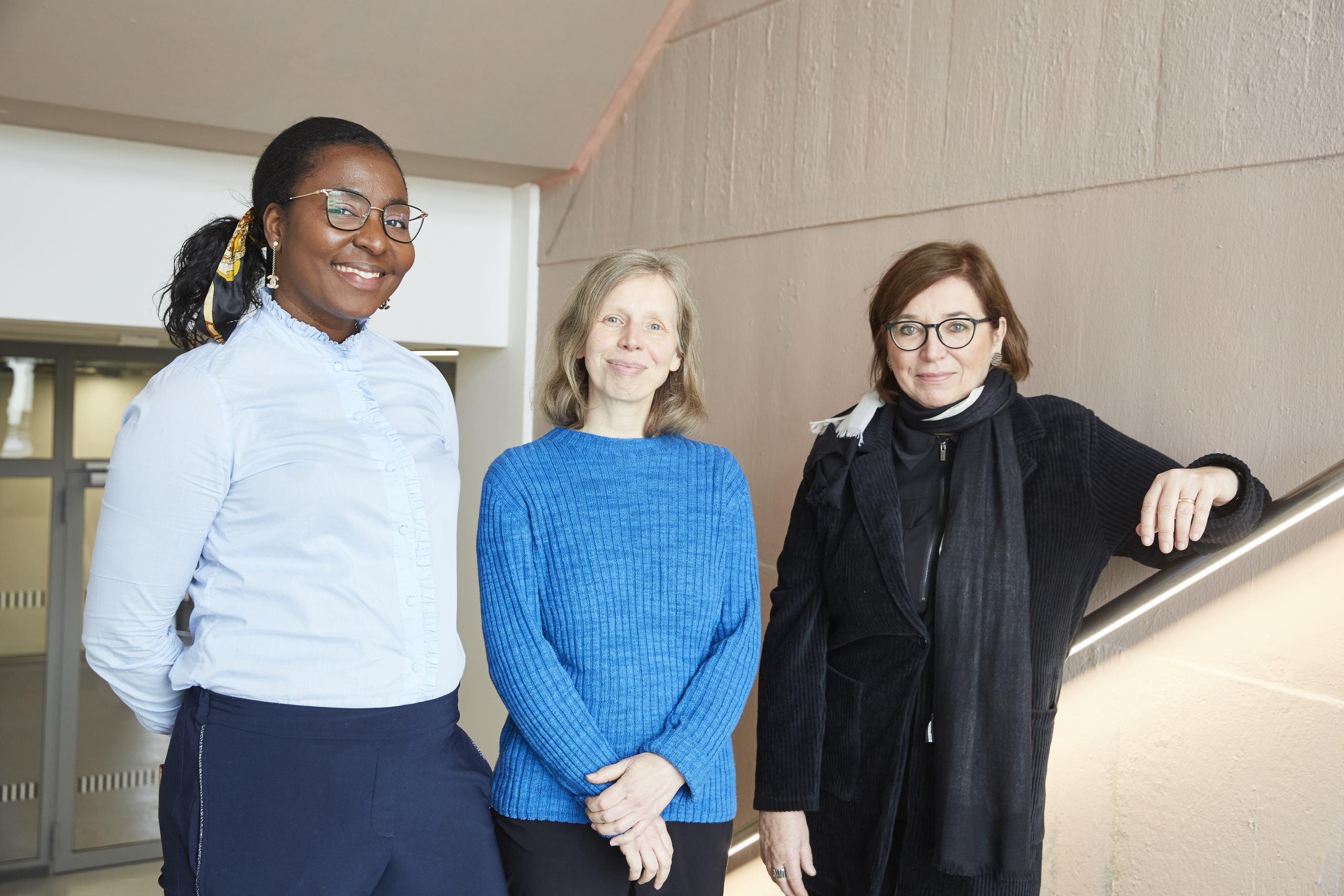Opening doors

The h_da Language Centre is one of the forces driving internationalisation. Now it is coming under central University management – and, with the EUt+ university alliance, internationality and transculturality are key parts of the strategy.
By Kilian Kirchgessner, 28 March 2023
Nicola Erny still remembers the journey to Indonesia well. In 2014 she and her husband were sitting in a café when they got into conversation with a European engineer. “He was there to work on a company project for six months and told us now intercultural misunderstandings kept cropping up,” Erny recalls. For the pioneer and Dean of the Faculty of Social Sciences at the h_da, it was one of many light-bulb moments. “I’ve seen again and again that the social and cultural accompanying study programme offers benefits for all the faculties, including topics that enhance intercultural awareness.”
Since that time, a lot has changed at the Darmstadt University of Applied Sciences. Intercultural competences have become a key pillar of the university strategy. Interculturality and transculturality are gaining importance, partly due to the EUt+ (European University of Technology), an alliance of eight universities from all over Europe. “We see these topics as cross-cutting tasks for teaching and research, and for knowledge transfer,” Nicola Erny explains.
The Language Centre which she heads plays one of the major roles in this process. It helps to ensure that internationalisation is more than merely a buzzword. Erny and her team are convinced that languages are essential for overcoming cultural differences. In Darmstadt this is now manifested in the university structure, and most obviously in the fact that the Language Centre (until now part of the Faculty of Social Sciences) will now be a central unit answering directly to the university management. “The Language Centre should be one of the forces driving internationalisation,” says Nicola Erny, adding: “It helps promote intercultural understanding and overcome barriers.”
Pitfalls in language lessons
Language lessons therefore do more than putting over vocabulary and grammar, as Tamara Onnis, responsible for intercultural communication at the Language Centre, knows. “Language learning must always include intercultural aspects, otherwise it won’t work,” she points out. In Cameroon, for example, everyone in the village is called “uncle” or “aunt.” “If I teach people from Cameroon these words in German, they also have to understand how they are used.” All language learners are confronted with such pitfalls of intercultural communication – learners of German as a foreign language just as much as learners of any other foreign language.
But what is the difference between interculturality and transculturality? “My area is philosophy, where clarifying concepts is one of the key tasks,” Nicola Erny says with a laugh. Her explanation starts in the 1970s, when the term “multiculturalism” was being coined. “It expresses the idea that different cultural traditions are maintained, but they exist alongside one another without much mixing. Interculturality is a phenomenon of globalisation. It focuses on continual encounters with members of other cultures, which have impacts on one’s own cultural development. And transculturality focuses on the plurality of lifestyles, fusion, mixing and interaction.”
Bundled expertise: networked languages centres
An international conference on this topic was held recently in Darmstadt. It was entitled “Inter/Multiculturalism in a Post Colonial Era: Languages and European Values” and involved the language departments of all the universities in the EUt+ alliance. “Within the EUt+ language pool we have been collaborating for a long time with the language centres of our partner universities. Here in Darmstadt we are responsible in particular for research,” says Stefanie Morgret from the h_da. Colleagues from all over Europe hold regular meetings to bundle their experiences – and work on shared projects where they can combine their expertise from the most varied fields.
One of the initiatives to emerge from this is the DaCaDu project– the abbreviation stands for the participating EUt+ universities of Darmstadt, Cartagena and Dublin. Many of its findings can still be accessed on the internet, such as a blog where students from the participating universities can document how they learn a foreign language together and look at the special features of the respective country. “When we present this project, our colleagues prick up their ears,” says Stefanie Morgret, co-initiator of the project, and adds: “Now more EUt+ partners want to join in and we’re developing new projects.”
The potential in these ideas is huge. Experts now talk of “blended mobility,” meaning that students from several universities cooperate closely both during a face-to-face phase and virtually from their own alma mater. So mobility is present primarily in the virtual realm, but through the regular interactive meetings it enables a real intercultural experience. In short, it is becoming part of everyday life.
A boost for the team spirit
This development is no longer confined to the language centres, but is spreading throughout the universities. “More and more teams are becoming intercultural and transcultural,” Tamara Onnis says, and stresses that this is not an end in itself: “These new connections are reflected in the team spirit!” The language centres are thus launching a development that is being taken up by all the universities in the EUt+. In Darmstadt demand for language courses is already rising, also from the teaching and administrative staff.
Evidently Nicola Erny had the right idea when she began working on interculturality and transculturality. “That was about ten years ago, and back then many people thought it would just be a flash in the pan,” she remembers. However, not least when large numbers of displaced persons arrived in 2015 it was clear that the topic would become increasingly important. In 2017 the first symposium was held in Darmstadt with the title “Current perspectives on inter- and transculturality”. Many participants had experiences similar to that of a student who commented: “Of course there are some things you know about, or at least you’ve heard of them. But there were many connections I wasn’t aware of. That leads to completely new ways of thinking!” This tentative beginning has now grown into a stable foundation.
Translation: Elizabeth Hicks
Contact
Christina Janssen
Science Editor
University Communication
Tel.: +49.6151.533-60112
Email: christina.janssen@h-da.de
Website: https://sprachen.h-da.de/ueber-uns
